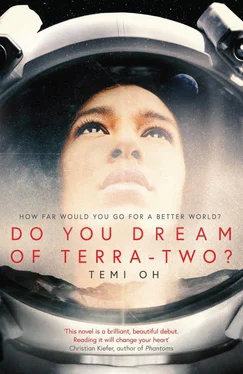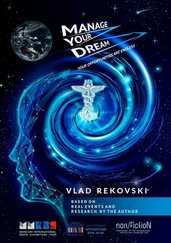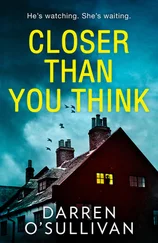That was how it began for Poppy. She found that she had a knack for languages, that her tongue bent easily into unfamiliar shapes, that learning each new language felt like furnishing the mansion of her mind with new rooms through which she could wander. Soon she was asking her mother for language courses for Christmas, finding the cheapest ones she could afford, online lessons, podcasts. She requested Harry Potter in Japanese, Polish, Swahili. And the more she learned, she found, the more her mind was able to acquire, as if it was some impossible well that could never be filled. At first, Poppy used languages to help her to escape her mother’s neglect, but later, she discovered with delight that the languages could help her to escape her whole insipid life.
She had probably been given an interview at Dalton because one local newspaper had named her the city’s youngest ‘hyperpolyglot’. Poppy had always suspected that something about a mind that could grasp the counter-intuitive logic of another language appealed to the directors of the space programme. It meant that Poppy had easily picked up computer coding, learned the syntax and semantics to express the algorithms.
‘What are you reading?’ Jesse asked, breaking into her reverie as he climbed down the ladder and squinted at the title. ‘Is that Harry Potter ?’
‘Yep.’ Poppy didn’t look up from the dog-eared pages.
‘In Italian?’
‘In Latin.’
‘Ha.’ Jesse smiled. ‘There’s a version in Latin?’
‘That’s right. Only the first two books though. I’ve heard there’s a version in Ancient Greek as well. It’s the longest Ancient Greek text written since AD 3.’
‘Children’s books in Ancient Greek – pretentious much?’ Harry said from across the room.
‘Says the man playing chess.’ Astrid rolled her eyes.
They’d gathered, as they often did after dinner, in the crew module, which after three weeks on the Damocles had taken on the same chaotic energy as their sixth-form common room. It was filled with the flotsam and jetsam of their confined lives. Abandoned board games, balled-up uniforms socks and UKSA-issued vests, joint property that no one felt strongly enough to lay claim to. That evening, Astrid was plaiting Juno’s hair into cornrows at one end of the room, Juno cross-legged on the floor, resting a cheek on her sister’s knees. Harry and Eliot were engaged in a hectic game of chess that involved moving their pieces and then hammering the timer down after each turn.
‘Nice to see someone reading a real book,’ Jesse said.
‘What do you mean “real book”?’ Juno asked, unable to turn her head as Astrid slid the oiled teeth of a comb into a tuft of her hair. ‘Like paper and glue?’
‘Yeah. Instead of the computer screens and tablets we always use. I know weight restrictions mean we can’t bring our whole personal library up here, but nothing compares, you know, to the smell of the paper, and a book doesn’t need batteries.’
Poppy flipped to the next page.
‘It’s not about paper and ink,’ Juno said. ‘What’s important is data. For the next generation. When we get to Terra what will happen to all our history, all our science? If our technology dies and that’s where all our information is recorded, will it take them another millennium to remember that bacteria causes disease? What happens to Sophocles and Sylvia Plath? It only takes a generation to lose all that. It’s all information, stored in terabytes of data in our hard drives. Backed up, incorporeal.’
‘It’s not just about preserving the past, though,’ Astrid said. ‘We’ll discover new things. Our children will write their own literature, new philosophies.’
Poppy reached the end of the chapter and stood up. Drawn, as she often was, towards the window. Up until this point in the journey she could cover Earth with a thumb pressed against the glass, watch as it diminished to the size of a blue star. But, that evening, Earth had disappeared altogether. She examined the other windows, rubbed the sleep from her eyes, wished it back into being.
‘What are you looking for?’ Astrid noticed her agitation.
‘Have you seen it?’ She was surprised to find that her stomach was suddenly tight as a fist inside her.
‘What?’ Astrid blinked in confusion.
‘Home,’ Poppy said. ‘It’s gone.’ Eliot and Harry looked up from the chequered board.
Astrid got up off the sofa. She pressed her face to the window in silence, then said, ‘So it is’, her voice light with wonder.
‘Don’t be melodramatic,’ Eliot said, without looking up. ‘It’s not “gone”. Where would it go? It just looks like a star.’ He glanced up at them then sighed, walking over to the glass wall and beckoning them over. ‘Look over there—’ he pressed his finger against it. ‘Earth looks just like a star. A big star, and right next to it – there, can you see? – the moon. It’s just smaller. In a day or two you’ll need a telescope to see it.’
A wide smile spread across Astrid’s face. ‘It’s beginning,’ she said, and walked back to the sofa.
‘What is?’ Harry looked a little uneasy, though he’d returned to his game. Juno returned to her position under her sister’s comb.
‘Can you feel it in here?’ Poppy asked them, touching her stomach. ‘Like spacesickness…?’
Astrid shook her head. ‘The best part of the journey,’ she said. ‘Everything’s ahead of us.’
Something about Astrid’s words and the glee with which she delivered them made Poppy feel ill, an elevator-drop panic that she had been cast adrift in this nothingness, continually accelerating away from sky and sea and solid ground. She had to run back into the bedroom before her mouth dropped open with a cry of fear and despair in front of the others.
Sobs tore out of her, and with them everything she had been hiding for weeks, months. Her private doubts about the mission, her loneliness, her grief for home and for Ara and everything she had left behind. Then other things too, the tumult of the pre-launch days compared to the lull of space, her boredom, her impotence and wriggling insecurity. Her sobs came out in huge quaking gasps and even as they did she felt the indulgent satisfaction of them. All those years in Dalton it hadn’t been okay to cry, but today…
Est quaedam flere voluptas. There was a certain pleasure in weeping.
Poppy only looked up a little while later, when she heard the sound of the door clicking open. She drew a hand across one eye, wiping away just enough of the tears to see Harry’s outline in the light.
He observed her silently for a moment, with an expression she couldn’t discern. ‘You look so ugly when you cry,’ he said.
And she saw him for a moment, as she sometimes did, as just a little bit mean, his mouth twisted in a cruel sort of smile. But in the next moment he leant down and kissed her. She’d seen the shampoo that he used in his bathroom cubbyhole, an expensive brand. Sicilian lemon and tangerine. The smell was heady.
‘I feel it here too.’ He touched his stomach in the same place she had. ‘It hurts for me too.’
07.06.12
ASTRID WAS SURPRISED WHEN Poppy did not turn up for their lesson on Thursday. Group sessions normally took place around the kitchen table, with the senior crew member taking them standing at the head. That afternoon it was Cai, and the room was still ripe with the smell of the rehydrated chicken soup they’d had for lunch.
‘There are five of you,’ Cai said, looking over all of their heads as if he was not certain.
‘Poppy says she’s sick,’ Juno said, flicking a sticky pea off the table. ‘Who was on cleaning duty this week?’
Читать дальше






![Theresa Cheung - The Dream Dictionary from A to Z [Revised edition] - The Ultimate A–Z to Interpret the Secrets of Your Dreams](/books/692092/theresa-cheung-the-dream-dictionary-from-a-to-z-r-thumb.webp)





